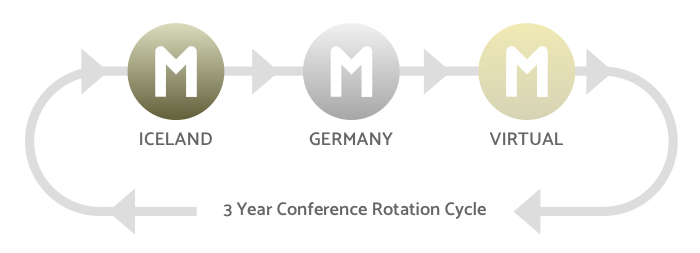Joschi and Brian, the two main organizers of Material, briefly talked about changes to the conference, but we wanted to float this idea to get feedback and spur on new ideas.
Back in 02015-16 when Joschi and Brian first talked about starting an event focusing on the more fundamental building blocks of the Web, it was certainly a different time. We wanted to invite people to come see the wonders of Iceland and experience the country. We also wanted to bring a great event to the local community. As it turns out, both have been difficult and got harder each year.
The first attempt in 02016 was a Kickstarter campaign. For various reasons, it didn’t get funded. The next year, we took the plunge and accepted a loss to break out of the chicken-and-egg cycle. We needed an event to show people what kind of event it is.
In 02018, we got smarter and only lost a little financially. The goal is never to make money, but we certainly can’t go on if we can’t make it sustainable.
Then, Material 2020 was cancelled/delayed due to the global COVID-19 pandemic. We refunded tickets, got flight credit for some speakers and owe a lot of trusting and supportive 02020 attendees a credit ticket to the next event!
It’s now 02021 and we still don’t have any plan for when the conference will be rescheduled. Even if Iceland manages to get things under control soon, we need speakers and attendees from other countries and there are still plenty of travel restrictions.
In all this downtime, we’ve been thinking about the conference and what shape it might take in the future.
Given what we know about climate change, we have a personal responsibility to minimize our impact. Having an annual conference where more than 50% of the attendees and speakers are coming from abroad certainly isn’t helping.
The BBC has a programme/podcast called Rethink all about what we can do differently after the pandemic. What new opportunities are there with our new knowledge and experience: it is possible to break the norms of a daily commute, the concept of work visas tied to companies within a country’s boarders, how we eat and take care of ourselves and much more.
In one episode of Rethink, Jarvis Cocker was explaining how wild life has come back to his area. Hearing all the birds again made him realize that this is what it should be, but we humans changed it. He talks about Charles Townshend who popularized the idea of crop rotations in the 18th century. Farmers tended three fields and only sowed seeds in two, giving the third a year to rest. Each year you’d rotate which was resting creating a three year cycle. This simple change, while seeming bad in the short term not maximizing the fields, actually helped in the long term by not depleting the vital nutrients.
The take away from the episode was what if we all took every 3rd year and didn’t travel. Would that give the Earth some time to rest and recuperate?
That got us thinking about Material. Maybe we should think about a “crop rotation” method for our event? One year in Iceland to help benefit the local community, then the following year move to Germany so it is easier for people to attend, then a third year of rest and change the format to a virtual or remote event. Then repeat on that three year cycle.

Rotating allows for us to play with the format each year. The Iceland event has always been small and cozy. Germany could be bigger with a slightly different angle on the concept of Material, then the virtual event could be cheaper/free to bring in more attendees from around the world who don’t have the opportunities or means to travel.
The conference itself is very focused on physical things that people have made, either through the Web or are made of the Web. One idea might be to have the virtual event for cheap or free, but have a higher priced supporters tier. That money is in turn given to creators who send attendees physical examples of their work as a keepsake and memento of the event.
Time will tell how willing we are to jump back into travel and conference mode that requires being in a confined, hot room with a hundred other people. We are all craving human contact and conversations face to face, but maybe we’re not ready yet.
The bigger question is if it is sustainable or even ethical or moral to encourage big travel for so many attendees? These are just a few of the questions we think about as we look to the horizon and keep an eye out for any sort of sign when we will be able to meet at the next Material Conference.
In the mean time, you can watch or listen to all the previous sessions online at the Material Archive.